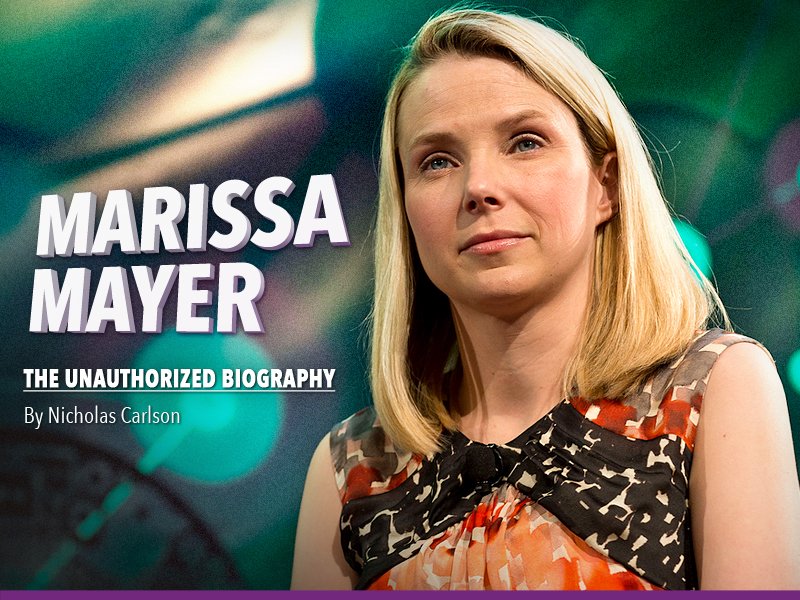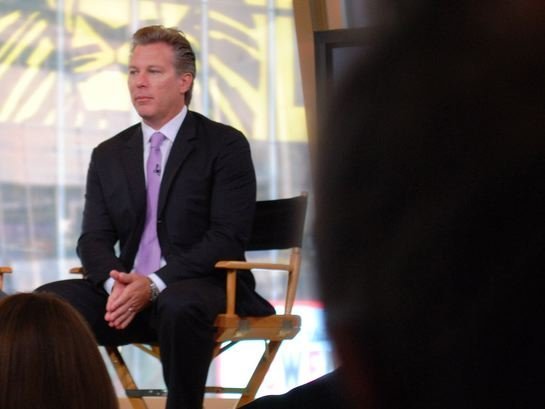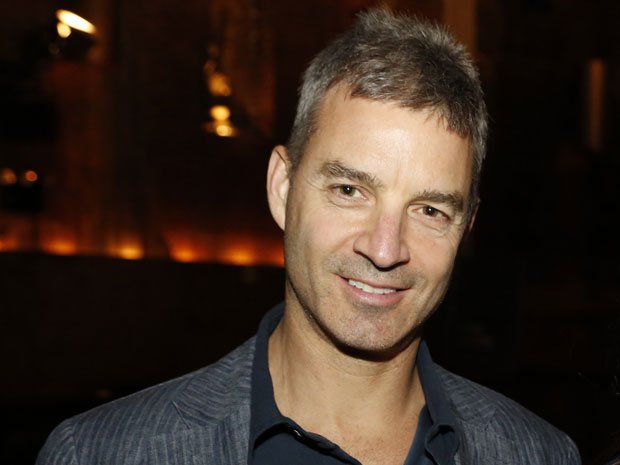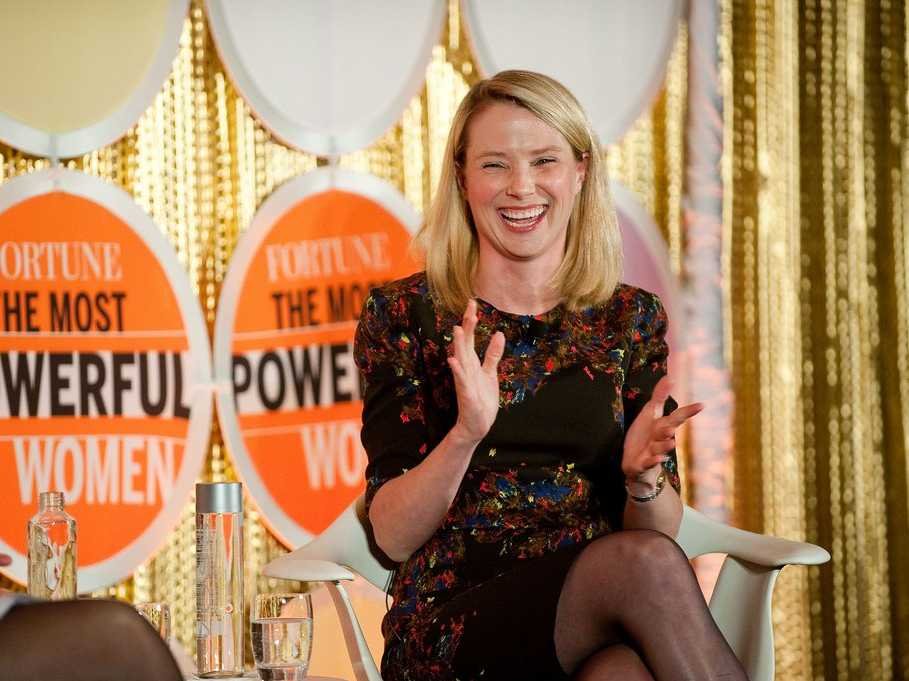The Truth About Mariss Meier: An Unofficial Biography [introduction]
A few notes: first, a huge thanks to the HotWaterMusic user for the lion's share of the translation work that he completed. Secondly, now neither he nor I have the opportunity to continue the translation - and this is about 70 pages of A4. If someone suddenly wants to take on this, please write to me in a personal, so that I know that there are those who wish. Or create a comment thread so that anyone can coordinate in it.

On a warm summer morning, July 12, 2012, Yahoo's interim CEO Ross Levinson still believed that he would become the company's permanent CEO.
')
There was only one meeting before his departure.
It was a board meeting that was to be held in the huge conference room on the first floor of Yahoo headquarters in Sunnyvale, California. In Yahoo, this room was called “Phish Food” - it was a stylish room, full of glass, white leather sofas and chairs to the top.
The agenda was as follows: Levinson presents his plan for Yahoo, after which he becomes a permanent CEO.
Levinson entered the room. All his top managers followed him. Among them was Jim Heckman, the lead organizer of transactions in the Levinson team. He spent the last months negotiating with Microsoft. Chief Production Manager Shanti Seth. In her head, a plan was already prepared for the long awaited update of Yahoo Mail and the Yahoo home page. CFO Tim Morse. He has just completed a sale of a subordinate Yahoo company to Alibaba. This deal just saved the company. Veteran News Corp. Mickey Rosen, who Levinson hired to manage the business part of Yahoo. Molly Spillman. Her Levinson just made the marketing director.
Heckman, Seth, Morse, Rosen, Spillman and a few others sat aside.

They all thought that the meeting was just a formality, and Levinson had already gotten his job.
And they had good reasons to be sure. For the past two months, Fred Amoroso, the head of Yahoo, has made it clear that he is ready to do anything to make Levinson and his team the managers of the company for the foreseeable future.
Amaroso told Levinson in private that he would inform Yahoo employees during a meeting in May. He even took part in a meeting with clients (to conclude a sales transaction — clarification can, or even need, be thrown out) in order to demonstrate his support for Levinson to Yahoo advertisers — a rather unusual act for the director.
In June, Amoroso helped Levinson lure away a high-profile Google manager, Michael Barrett. During the hiring process, Amoroso promised Barrett that Levinson’s temporary “title” was just a formality, so you can’t be afraid to leave Google.
Levinson had one more reason to hope: for the past few months, he spoke with two of Yahoo's most important new directors, Dan Loeb and Michael Wolf, almost every day. No matter how important for Levinson, supporting Amoroso, he needed even more support from Loeb. Loeb managed Third Point's hedge fund, which owned more than 5 percent of Yahoo. Just a few months before, he had forced the previous CEO of Yahoo to resign. Wolfe was also an important ally for Levinson - the former president of MTV worked as a Third Point investment adviser when Loeb called him to join Yahoo’s board of directors and lead the search for a new CEO.
Levinson began his presentation. It was supposed to be a surprise for everyone, because he planned to seriously change the direction of the development of Yahoo.
He wanted to stop the technological race with giants like Google and Microsoft, and to focus on competing with media and content businesses like Disney, Time Warner and News Corporation. Part of the transformation would be the closure or sale of several divisions of Yahoo, which he said could reduce the number of employees by 10,000 and increase the company's profit by 50%.
In fact, at the meeting, Levinson said that he and his team had already begun to go this way.
Levinson told the board that, under his administration, Heckman had begun negotiations with Microsoft to exchange Yahoo's search business for Microsoft — MSN.com — and receive large cash payments. Levinson and Hekman also discussed with Google manager Enrique De Castro the possibility of selling a portion of Yahoo’s advertising resources. In addition, there was talk about the use of Yahoo's advertising business in conjunction with an advertising startup from New York AppNexus.

During this part of the presentation, Levinson had the feeling that the place of permanent CEO at Yahoo was slowly floating away.
Others in the room felt the same way.
Wolf, who was assigned to search for a permanent CEO, began to doubt the expediency of the deal. He asked in a loud, stern voice, “I, of course, understand that it is beneficial for Microsoft, but what is the benefit for Yahoo?”
Harry Wilson, another director who was hired by Loeb, joined Wolfe in criticizing the short-sightedness of the deal. Together they began a cross-examination, which eventually led to one question: did Levinson and Hekman take on any irreversible obligations to Microsoft or Google?
For some in the room, it became obvious that Wolf and Wilson wanted to make sure that another candidate for the role of CEO would not have to fulfill the conditions of a deal in which they did not plan to participate.
It was a bad sign for Levinson, but Wilson and Wolf’s indignation was not the worst. It was worse to see Loeb's behavior.
Externally, Loeb looks like a representative of Wall Street: this is a typical well-groomed man in a suit. He allows himself to carelessly relate only to his own hairstyle, and even then for a reason - he is from Southern California, and sometimes the spirit of a real surfer wakes up in him - apparently, that’s why he cannot sit still.
So, during the presentation of Levinson, Loeb looked bored. Levinson could not grab his attention. He just stood behind everyone and played with his BlackBerry.
Someone later recalled that Loeb was typing something, after which - during the most important part of the presentation - he got up and went to the restroom, where he spent ten minutes. At that moment, the thought "Forgive Ross, but from now on you are not a CEO" came to mind.
After the meeting, Barret and Google manager Amaroso called Levinson into their room to find out how it all went. Levinson informed them that he no longer hopes to get a job.
But if he doesn't get the job ... then who?
That night, Levinson flew to Sun Valley, Idaho, where Allen & Co. investment bank. spends annual leave for managers from media and technology companies.
During the holidays, Levinson played a “guessing game” with venture capitalist Mark Anderson, CEO Square Jack Jack Dorsey and CEO Twitter Twitter Dick Costolo. Together they looked at long lists of names, suggesting who would take the place that Levinson wanted. But for each of the list was a bunch of reasons why this person could not become a CEO.
In whose favor did Volf and Loeb make their choice?
Finally, late on Sunday night, a call came from a friend from Google, who asked him only one question: did he hear that Marissa Meyer was interviewed at Yahoo last Wednesday?
Levinson understood at once. He now knew who the next CEO at Yahoo would be. Soon everyone else will know.
On Monday, July 16, four days after the commemorative meeting, Yahoo officially announced: the 37-year-old Marissa Meyer is becoming the new CEO of the company. In fact, the board of directors had already made an offer to Meyer by the time Levinson walked to the meeting to talk about his own plans for the development of Yahoo.
After the news broke out, Levinson confessed to friends that he was very disappointed. He dreamed of getting this job and he believed that he would cope well with it. He also felt guilty about his team, which now has to serve a stranger.
But in the depths of Levinson everything was calm. If he lost, he lost to the real “icon”. Indeed, in the world there are no more people like Marissa Meyer.

At 38, she is a wife, mother, engineer and CEO of a company with a budget of 30 billion dollars. She is a woman in an industry ruled by men. In a world where shareholders only expect earnings reports from corporations, it puts user convenience first. If the latter could remind you of Steve Jobs, then do not rush - unlike him, Marissa Meyer allows herself to live to the fullest - at least the $ 300 million fortune allows her to live in a penthouse at the Four Seasons Hotel in San Francisco. And while Marc Zuckberg or Larry Page dress in T-shirts, sweatshirts and slippers, Meier wears Oscar De La Renta dresses.
Meyer calls herself a “geek”, but she doesn’t look like a drop. Blonde with blue eyes, looking like a photograph from a glamor magazine - this is more a Hollywood actress than someone else.
Young, rich, smart - Meyer is literally a role model for the modern generation of women. And, at the same time, unlike Cheryl Sendberg (Facebook's chief operating officer), she refuses to call herself a feminist. She even angered mothers working around the world by banning Yahoo employees from doing their jobs at home.
Despite the fact that the general public usually admires Meier, she has many enemies in her professional field - those who think she is too much like a robot and reach the point of absurdity in her manic attention to detail, and her obsession with user experience is only an attempt to hide the mercantile side of high technology.
There is some truth in their words. But, nevertheless, in the year that Mayer was at Yahoo, the price of the company's stock rose 100 percent. Engineers want to work on Yahoo again. And, most importantly, Tumblr CEO David Karp, who recently sold his startup Tumblr to Yahoo for $ 1.1 billion, is of the same opinion.

On a warm summer morning, July 12, 2012, Yahoo's interim CEO Ross Levinson still believed that he would become the company's permanent CEO.
')
There was only one meeting before his departure.
It was a board meeting that was to be held in the huge conference room on the first floor of Yahoo headquarters in Sunnyvale, California. In Yahoo, this room was called “Phish Food” - it was a stylish room, full of glass, white leather sofas and chairs to the top.
The agenda was as follows: Levinson presents his plan for Yahoo, after which he becomes a permanent CEO.
Levinson entered the room. All his top managers followed him. Among them was Jim Heckman, the lead organizer of transactions in the Levinson team. He spent the last months negotiating with Microsoft. Chief Production Manager Shanti Seth. In her head, a plan was already prepared for the long awaited update of Yahoo Mail and the Yahoo home page. CFO Tim Morse. He has just completed a sale of a subordinate Yahoo company to Alibaba. This deal just saved the company. Veteran News Corp. Mickey Rosen, who Levinson hired to manage the business part of Yahoo. Molly Spillman. Her Levinson just made the marketing director.
Heckman, Seth, Morse, Rosen, Spillman and a few others sat aside.

They all thought that the meeting was just a formality, and Levinson had already gotten his job.
And they had good reasons to be sure. For the past two months, Fred Amoroso, the head of Yahoo, has made it clear that he is ready to do anything to make Levinson and his team the managers of the company for the foreseeable future.
Amaroso told Levinson in private that he would inform Yahoo employees during a meeting in May. He even took part in a meeting with clients (to conclude a sales transaction — clarification can, or even need, be thrown out) in order to demonstrate his support for Levinson to Yahoo advertisers — a rather unusual act for the director.
In June, Amoroso helped Levinson lure away a high-profile Google manager, Michael Barrett. During the hiring process, Amoroso promised Barrett that Levinson’s temporary “title” was just a formality, so you can’t be afraid to leave Google.
Levinson had one more reason to hope: for the past few months, he spoke with two of Yahoo's most important new directors, Dan Loeb and Michael Wolf, almost every day. No matter how important for Levinson, supporting Amoroso, he needed even more support from Loeb. Loeb managed Third Point's hedge fund, which owned more than 5 percent of Yahoo. Just a few months before, he had forced the previous CEO of Yahoo to resign. Wolfe was also an important ally for Levinson - the former president of MTV worked as a Third Point investment adviser when Loeb called him to join Yahoo’s board of directors and lead the search for a new CEO.
Levinson began his presentation. It was supposed to be a surprise for everyone, because he planned to seriously change the direction of the development of Yahoo.
He wanted to stop the technological race with giants like Google and Microsoft, and to focus on competing with media and content businesses like Disney, Time Warner and News Corporation. Part of the transformation would be the closure or sale of several divisions of Yahoo, which he said could reduce the number of employees by 10,000 and increase the company's profit by 50%.
In fact, at the meeting, Levinson said that he and his team had already begun to go this way.
Levinson told the board that, under his administration, Heckman had begun negotiations with Microsoft to exchange Yahoo's search business for Microsoft — MSN.com — and receive large cash payments. Levinson and Hekman also discussed with Google manager Enrique De Castro the possibility of selling a portion of Yahoo’s advertising resources. In addition, there was talk about the use of Yahoo's advertising business in conjunction with an advertising startup from New York AppNexus.

During this part of the presentation, Levinson had the feeling that the place of permanent CEO at Yahoo was slowly floating away.
Others in the room felt the same way.
Wolf, who was assigned to search for a permanent CEO, began to doubt the expediency of the deal. He asked in a loud, stern voice, “I, of course, understand that it is beneficial for Microsoft, but what is the benefit for Yahoo?”
Harry Wilson, another director who was hired by Loeb, joined Wolfe in criticizing the short-sightedness of the deal. Together they began a cross-examination, which eventually led to one question: did Levinson and Hekman take on any irreversible obligations to Microsoft or Google?
For some in the room, it became obvious that Wolf and Wilson wanted to make sure that another candidate for the role of CEO would not have to fulfill the conditions of a deal in which they did not plan to participate.
It was a bad sign for Levinson, but Wilson and Wolf’s indignation was not the worst. It was worse to see Loeb's behavior.
Externally, Loeb looks like a representative of Wall Street: this is a typical well-groomed man in a suit. He allows himself to carelessly relate only to his own hairstyle, and even then for a reason - he is from Southern California, and sometimes the spirit of a real surfer wakes up in him - apparently, that’s why he cannot sit still.
So, during the presentation of Levinson, Loeb looked bored. Levinson could not grab his attention. He just stood behind everyone and played with his BlackBerry.
Someone later recalled that Loeb was typing something, after which - during the most important part of the presentation - he got up and went to the restroom, where he spent ten minutes. At that moment, the thought "Forgive Ross, but from now on you are not a CEO" came to mind.
After the meeting, Barret and Google manager Amaroso called Levinson into their room to find out how it all went. Levinson informed them that he no longer hopes to get a job.
But if he doesn't get the job ... then who?
That night, Levinson flew to Sun Valley, Idaho, where Allen & Co. investment bank. spends annual leave for managers from media and technology companies.
During the holidays, Levinson played a “guessing game” with venture capitalist Mark Anderson, CEO Square Jack Jack Dorsey and CEO Twitter Twitter Dick Costolo. Together they looked at long lists of names, suggesting who would take the place that Levinson wanted. But for each of the list was a bunch of reasons why this person could not become a CEO.
In whose favor did Volf and Loeb make their choice?
Finally, late on Sunday night, a call came from a friend from Google, who asked him only one question: did he hear that Marissa Meyer was interviewed at Yahoo last Wednesday?
Levinson understood at once. He now knew who the next CEO at Yahoo would be. Soon everyone else will know.
On Monday, July 16, four days after the commemorative meeting, Yahoo officially announced: the 37-year-old Marissa Meyer is becoming the new CEO of the company. In fact, the board of directors had already made an offer to Meyer by the time Levinson walked to the meeting to talk about his own plans for the development of Yahoo.
After the news broke out, Levinson confessed to friends that he was very disappointed. He dreamed of getting this job and he believed that he would cope well with it. He also felt guilty about his team, which now has to serve a stranger.
But in the depths of Levinson everything was calm. If he lost, he lost to the real “icon”. Indeed, in the world there are no more people like Marissa Meyer.

At 38, she is a wife, mother, engineer and CEO of a company with a budget of 30 billion dollars. She is a woman in an industry ruled by men. In a world where shareholders only expect earnings reports from corporations, it puts user convenience first. If the latter could remind you of Steve Jobs, then do not rush - unlike him, Marissa Meyer allows herself to live to the fullest - at least the $ 300 million fortune allows her to live in a penthouse at the Four Seasons Hotel in San Francisco. And while Marc Zuckberg or Larry Page dress in T-shirts, sweatshirts and slippers, Meier wears Oscar De La Renta dresses.
Meyer calls herself a “geek”, but she doesn’t look like a drop. Blonde with blue eyes, looking like a photograph from a glamor magazine - this is more a Hollywood actress than someone else.
Young, rich, smart - Meyer is literally a role model for the modern generation of women. And, at the same time, unlike Cheryl Sendberg (Facebook's chief operating officer), she refuses to call herself a feminist. She even angered mothers working around the world by banning Yahoo employees from doing their jobs at home.
Despite the fact that the general public usually admires Meier, she has many enemies in her professional field - those who think she is too much like a robot and reach the point of absurdity in her manic attention to detail, and her obsession with user experience is only an attempt to hide the mercantile side of high technology.
There is some truth in their words. But, nevertheless, in the year that Mayer was at Yahoo, the price of the company's stock rose 100 percent. Engineers want to work on Yahoo again. And, most importantly, Tumblr CEO David Karp, who recently sold his startup Tumblr to Yahoo for $ 1.1 billion, is of the same opinion.
Source: https://habr.com/ru/post/192208/
All Articles